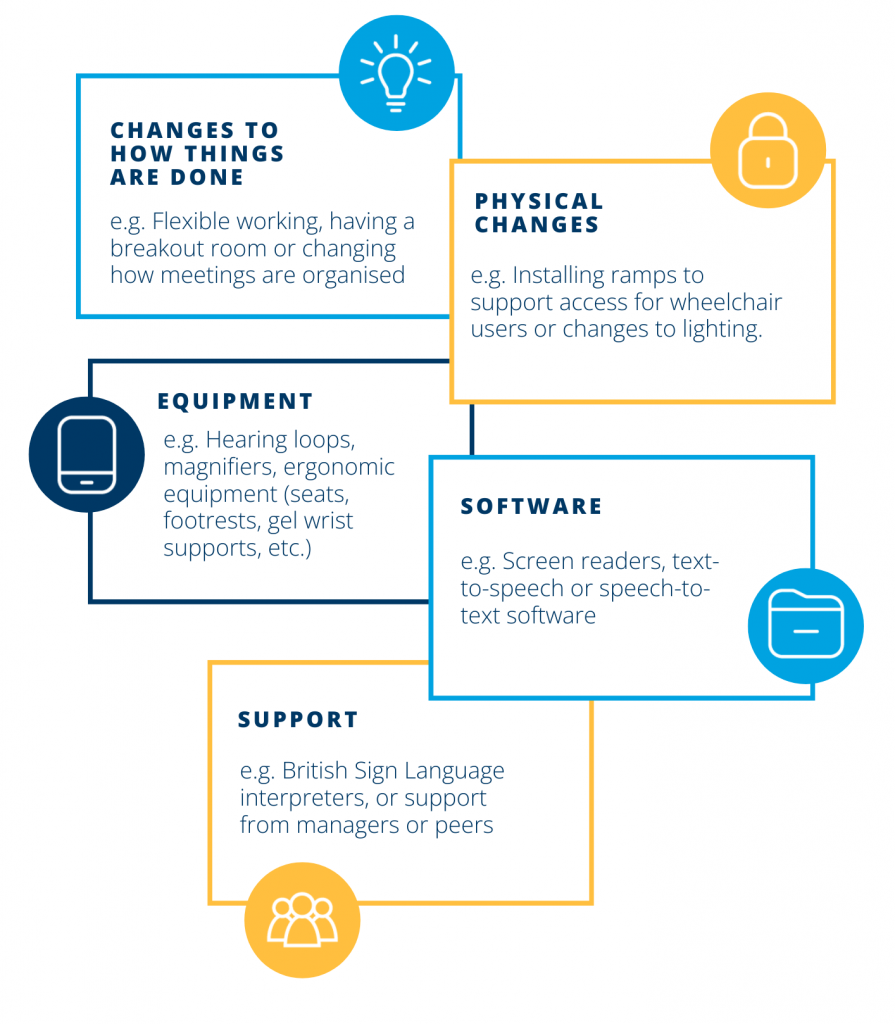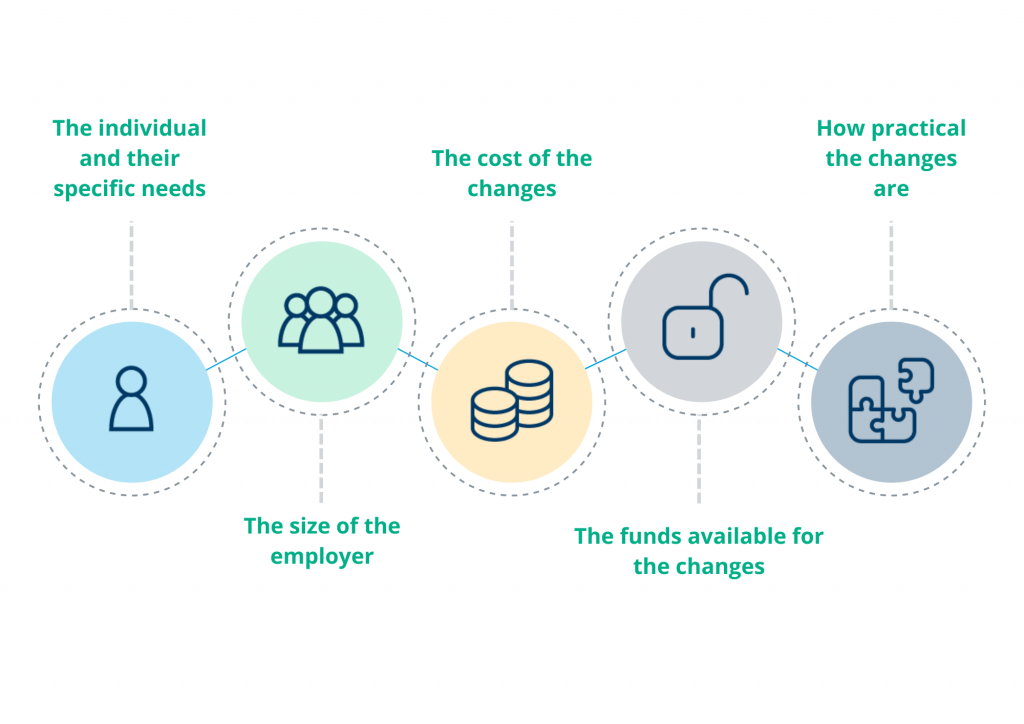What are reasonable adjustments in the workplace?
Reasonable adjustments in the workplace are changes employers must make to ensure employees with disabilities, or mental and physical health conditions are not at a disadvantage. They might be changes to how things are done, physical changes to the workplace or the provision of equipment, software or support for an employee.
Examples of these could include the following:

Why are reasonable adjustments in the workplace so important?
Around 20% of the UK population are neurodivergent or have physical or mental health conditions such as ADHD, Dyslexia and Depression. The Equality Act 2010 means employers have a legal responsibility to put in place ‘reasonable adjustments’ to ensure that such employees (or potential employees e.g. during recruitment and selection) are not disadvantaged or otherwise discriminated against.
Reasonable adjustments in the workplace often:



Employees who need reasonable adjustments to be made have a right to raise concerns. These adjustments can help relieve frustrations and help them feel more confident and valued at work.
The Equality Act 2010 also covers many other protected characteristics, like age, sex, sexual orientation, race, religion or belief. At Aim Forward, we focus on reasonable adjustments for employees who are neurodivergent or have physical or mental health conditions.
What is ‘reasonable’?
Whether an adjustment is considered ‘reasonable’ depends on several different factors. These include:

The employer is responsible for the cost of making any reasonable adjustments. An employer can turn down a request for an adjustment if they find it unreasonable. For example, if the cost of the adjustment would be damaging to the business. If this is the case, the employer is still required to make other reasonable adjustments.
If there’s a disagreement as to whether an adjustment is reasonable, an employment tribunal can make the decision.
How to know what reasonable adjustments to make
Under the Equality Act 2010, employers are required to make reasonable adjustments in response to employees disclosing a disability and requesting reasonable adjustments.
Speak to the employee about how their condition may impact how they perform in their role. Ask what may have worked for them in the past, or what they think could help going forward. This will help you to understand what adjustments they think they may need or benefit from, and these can then be considered as potential reasonable adjustments.
Your employee may be in the large percentage of people who know they are neurodivergent but don’t have a diagnosis. They may feel that changes can be made to get the best out of their daily work life and look to you for support and guidance.
It can be difficult to know what adjustments to make, because your employee may not know what adjustments are available, or what adjustments would be helpful for them. Not all conditions are immediately visible and there is no one-size-fits-all approach.
At Aim Forward, we provide one-to-one needs assessments that can help you and your employees understand how they learn and work. This will provide you with the strategies to put in place to help your employees thrive, and a personalised report to help facilitate conversations.
Are reasonable adjustments expensive?
Reasonable adjustments don’t need to be expensive. 96% of reasonable adjustments are free. Here are some of the ways you can support your employees:
1. Improve your awareness – Talk to your colleague or employee, and ask them about their neurodivergence, mental or physical health condition, how it impacts them and what you can do to help.
Here are a few tips:





2. Provide support – Support can take different forms. This could be informal or unstructured support, like being able to check in with your manager, or more formal or structured support like peer mentoring. Some employees may need support with their workload if their work impacts their disability, or if their disability impacts their ability to manage their workload.
3. Adjustments to physical access – Small changes can make a big difference. These can be simple things like which shelf stationary is kept on, adjusting lighting levels or keeping corridors, doorways and access to equipment clear from boxes or obstacles.
4. Display screen adjustments – The Health and Safety (Display Screen Equipment) Regulations 1992 require all employers to protect their workers from health and safety risks of working with display screen equipment. The Health and Safety Executive provides a checklist for display screen equipment, including low-cost adjustments like laptop risers, external keyboards and second monitors.
5. Time management – Adjustments to scheduling, time management, organisation and time allocated for tasks can make a big difference to productivity for an employee.
6. Flexible working – Flexible working can include both when and where people work. Flexible working has become much more common since Covid-19. Many more employers now view it as a positive way to increase productivity and reduce absenteeism or presenteeism.
7. Communication – Communication can create many barriers, and is often associated with neurodivergent diagnoses such as autism, dyslexia or ADHD, as well as certain mental health conditions. Talking about communication styles and individual preferences within the workplace can make a difference.
8. Assistive Software – Most computer or phone operating systems have assistive software built in that have functions like reading text aloud or dictating spoken words into text. These can increase productivity by reducing the amount of time spent reading or writing.
How Aim Forward can help you make reasonable adjustments in the workplace
Our needs assessments are designed to explore the impact of difficulties in the workplace as a result of an employee’s neurodivergence or mental or physical health condition.
We focus on the practical application of strategies that can be put in place as reasonable adjustments. We also provide a bespoke report that can help facilitate conversations about the support that can be put in place. The report outlines personalised strategies to help the employee work and learn their way, as well as any assistive technology recommendations discussed in the needs assessment. Follow-on coaching sessions can be arranged if further support or training is required to help embed the strategies into the workplace.
What are the advantages of making reasonable adjustments?
There are many advantages to making reasonable adjustments in the workplace, including:
- Supporting employees to work to their full potential, increasing productivity and performance
- Supporting the recruitment and retention of a talented workforce
- Increasing diversity in the workplace
- Improving team and organisational performance, including productivity, creativity and innovation
- Allowing employees with a neurodivergence, mental or physical health condition to have full access to their working environments
- Enhancing the company’s reputation
Employers often find that reasonable adjustments made to support employees with neurodivergence, mental or physical health conditions are beneficial for all employees. A focus on reasonable adjustments supports the wider team to foster new ways of working.
Conclusion
We believe that reasonable adjustments don’t have to be daunting or expensive, and can help employees excel in the workplace.
If you’d like a more individual approach to supporting your employees, our needs assessments can help you to identify potential reasonable adjustments in the workplace. Over 94% of our clients would recommend a needs assessment to a friend or colleague. Explore our case studies to find out more, or get in touch to book a needs assessment today.
Further reading:

